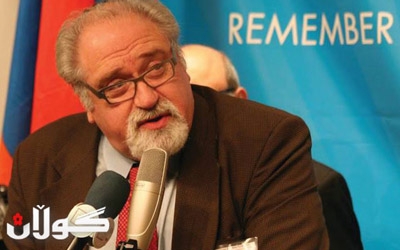Steven Jacobs: The plight of Kurdish women is both illegal and immoral even according to Islamic tradition and reading of the sacred Qur'an.
December 22, 2014
Exclusive Interviews

Jacobs: Firstly, the plight of Kurdish women is both illegal and immoral even according to Islamic tradition and reading of the sacred Qur'an. It violates every principle of human decency. The international community continues to address this in many arenas, but, sadly, these extremist and radical false interpreters of their own religious tradition do not recognize themselves as part of the international community, and falsely believe as well that the Holy God of Judaism, Christianity, and Islam smiles only on them.
Gulan: Some human rights scholars think that since this crime has been performed by a terrorist organization that has no international legitimacy, so they cannot take serious actions against it. Do you think is it possible that there is not an international law to defend enslaving of Kurdish women and selling them?
Jacobs: There are laws in many, many nations outlawing slavery, and the United Nations has addressed this over many years in such documents and conferences specifically concerned with the rights of women and children. But, as above, this so-called "Islamic state" refuses to both acknowledge any legal legitimacy outside itself, and thus does not see itself as part of the international community, and, therefore, has no obligation whatsoever to honor and respect what others have collectively enacted.
Gulan: What is the difference between Yezidi and Armenian Genocide? Why did the world recognize the Armenian mass murdering as genocide, but they hesitate in recognizing enslaving and mass murdering of Yezidis as Genocide?
Jacobs: The primary difference between the Armenian Genocides (plural) and the Yezidi Genocide (and, yes, from my perspective, I do regard what is happening as genocide) is that the former was legitimized by the state, first under the Sultan Abdul Hamid II and then under the secular state which replaced it. For the world community to also publicly proclaim the tragedy of the Yezidi people as genocide would mandate collective action against this rogue militant group. Given the other crises of the moment--Syria, ebola, etc.--the world is, simply put, not truly focused on a people it sees as a rather small in population and not yet center-stage in its thinking. By extension, interestingly enough, other than the Roman Catholic Church in the West, the world itself does not seem willing to address the ongoing crises of Christians throughout the Middle East; even the situation of the Copts in Egypt have not brought forth either significant condemnation nor direct action.
Gulan: Despite all the crimes against Yezidis and Christians in Iraq, currently there are over one and half a million refugees in Kurdistan region of Iraq, which is a large number for a place like Kurdistan region. As the winter approaches, their situations get worse day after day, and the international aids are very limited, do you think is it possible for the world to witness one and half a million refugees facing disaster?
Jacobs: It is a condemnation of humanity that it collectively continues to view inhumanity of any people against any other people without taking direct action more often than not. Aid and humanitarian organizations, some religious some not, continue to try, but these are rather small undertakings and oft-times dangerous in themselves, and, sometimes, they too meet with failure. The Biblical mandate of God in response to the Cain that, indeed, we are our brothers'/sisters' keepers goes unheeded.
Gulan: Despite enslaving them, IS terrorists ask Christians and Yezidis to turn into Islam. Which is a kind of genocide against minorities; do you think can this genocide proceed without any questioning?
Jacobs: Cultural genocide is, yes, in accord with Raphael Lemkin's (1900-1959) own understandings of what constitutes genocide going as far back as his paper to the Madrid Conference to the League of Nations (though he did not himself attend. It was read but not acted upon.) in 1933, where he drew the distinction between "vandalism" (the destruction of a culture) and "barbarism" (the physical destruction of a people). This was the man who authored our world genocide and was the motivating force behind the 1948 United Nations Convention on the Punishment and Prevention of the Crime of Genocide. Having written a good deal about him and his work, I have not doubts whatsoever that he would see the plight of the Yezidis as genocide.
Gulan: Is it possible for Yezidi victims to lodge a complaint in the international court in order to be compensated?
Jacobs: Yes, I do think it is possible for the Yezidis to lodge such a complaint with a request for restitution in the international legal arena, and I would be honored to sign on to such a document. However, given the defendants--the so-called "Islamic state"--I would tend to see it as a more symbolic act, perhaps providing something of a measure of comfort to suffering Yezidis, but, realistically and honestly, I do not believe such a lawsuit would be successful. The behaviors of these militants, and what I regard as an extremist and false interpretation of their own religious tradition is criminal rather than civil. As they continue to ignore whatever overtures have been enacted by the world community (and they have been precious few and largely unknown), they would simply choose to ignore this as well. But even recognition of this genocide without any compensation whatsoever is a worthwhile endeavor, and I encourage those who have the legal know-how to pursue this endeavor.















